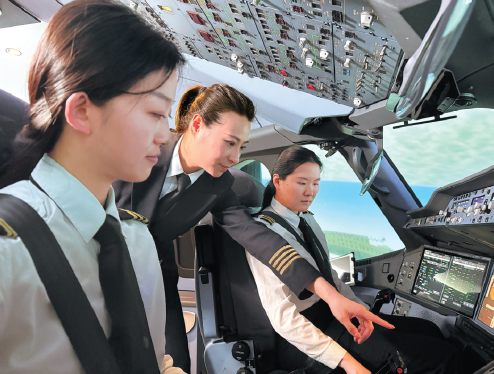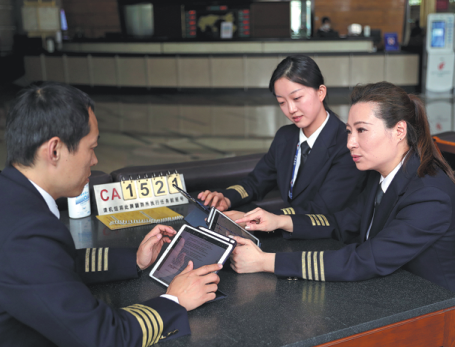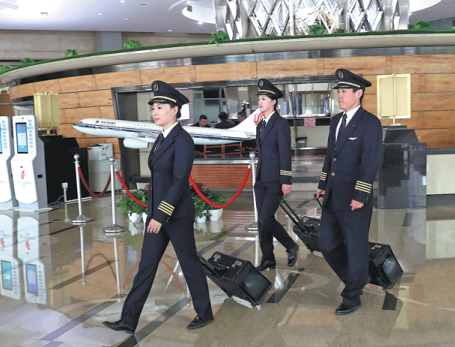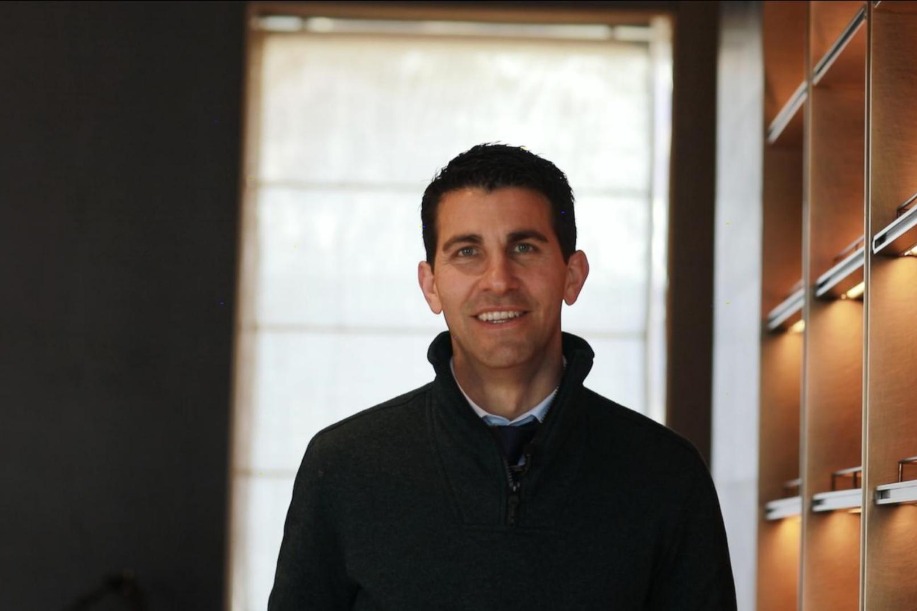PIONEERING FEMALE PILOT TAKES TO THE AIR WITH PRIDE
Skilled airline captain trains aviators, juggles family life

Life is filled with pivotal moments, each capable of steering a person onto a completely different path.
For Huang He, one such moment arrived when her school's dean informed her about a female pilot recruitment advertisement in a newspaper in 2003. Seizing this opportunity, she embarked on a journey that would change her life forever.
"I entered this industry (to become a pilot) by accident. At the time, I was a sophomore at Tianjin Normal University, majoring in computer science. One day, my dean mentioned that he thought I fit all the requirements listed in the newspaper for hiring a pilot and encouraged me to give it a try. I applied, passed all the tests, and have been a pilot ever since. I completely stumbled into this career," the 42-year-old said.
In 2003, Air China, one of China's largest airline companies and the national flag carrier, began recruiting pilots from among college students, breaking gender barriers by hiring male as well as female candidates.
The selection process was highly competitive, involving physical examinations, written tests and multiple rounds of interviews. Huang remembered sitting in a vast auditorium filled with hundreds of dreamers aspiring to soar through the skies.
Out of over 500 female applicants in 2003, only three successfully navigated the rigorous tests and secured the opportunity to become pilot trainees.
Huang transferred to Civil Aviation University of China in Tianjin to begin her pilot training, a customary process in China by which airline companies collaborate with universities to train and nurture aspiring pilots.
Joining Air China as a trainee pilot in 2005, she became one of the company's first female pilots and achieved the rank of captain by 2011.
As of the end of last year, only 843 female pilots held commercial flight licenses, according to the Annual Report of Chinese Civil Aviation Pilot Development 2023. This figure pales in comparison with the total number of pilots in China's airline companies, which stood at 57,854 by the end of 2022.
Breaking gender barrier
Throughout her career, Huang has striven to be recognized as a pilot rather than just a "female" pilot, advocating for true gender equality.
"When people stop calling us 'female' pilots, it will be true gender equality," she said.
Despite being one of the first female pilots in the industry, she never leveraged her gender for professional advantages.
Huang is deeply grateful that throughout her career, the company has consistently upheld gender equality and provided her with various opportunities to showcase and prove herself.
Huang's journey from co-pilot to captain in less than five years was a testament to her exceptional talent and relentless work ethic.
At a time when the average transition from co-pilot to captain took five to eight years, a period that has now been extended to eight to ten years, Huang's swift ascent was a result of seizing the opportune moment when China began training more pilots for its civil aviation industry.
As an instructor captain, Huang was sometimes challenged by older male trainees, but her proficiency and proactive approach won their respect.
"Fortunately, being a pilot is a technical profession. There were trainees — who were older than me — who challenged me, perhaps not because of my gender but my age. However, as soon as I took action, they were impressed and gave me a thumbs-up," Huang recalled.
"My skills speak for me," she said.
While she is comfortable working alongside her male colleagues, she is delighted to witness an increasing number of women joining the ranks.
Air China now has about 80 female pilots and co-pilots, a significant increase from the past.
"Even in the pilots' dining room, I can see more women," she said.
Huang is qualified to train co-pilots and pays particular attention to treating them equally, regardless of their gender, in an effort to avoid the biases she encountered two decades ago.
"Many girls in China dream of becoming flight attendants, a job associated with beauty and elegance. However, with the changing times, I believe that Chinese women have truly achieved the milestone of being able to work in the cabin as well as in the cockpit. Beautiful, graceful, and professional women can also work in the cockpit," Huang said.
Balancing family life
Although very busy, Huang has a happy family with a 12-year-old son. However, balancing her demanding career with family life has been a challenge.
Huang's profession often requires her to be away from home for extended periods, preventing her from participating in her son's daily activities. Being a pilot, it is impossible to pick up her child from school every afternoon or join all the parent and teacher meetings.
Despite this, she has found unwavering support from her family, particularly her parents and in-laws, who have played a crucial role in caring for her son during her absences.
Thanks to Chinese tradition, the older generation (big family) usually supports the young family.
"I cannot spend as much time accompanying my son as mothers in many other professions do. In terms of that, there is no way to make up for it. It is a sense of loss," she said, adding that her family has been a great support in caring for her son.
Huang's son is independent and has grown accustomed to his mother's frequent absence, she said.
However, as a child, he has expressed his desire for her to pick him up from school occasionally.
"I told him honestly that I cannot pick him up from school, but I can share with him the work experiences from my journeys. I can tell him about my trips across the world, which might be different from other mothers' stories," Huang said.
Despite the challenges, there have been memorable moments. She fondly recalls being invited to her son's kindergarten to talk about her profession.
"I showed the class a picture of the cockpit and told them that it was my office. I also explained the basics of flying to the class. Many children, including my son, were curious and interested in aerodynamics. Some mothers even asked me if there were any storybooks about this topic. After the activity, some kids approached me and wanted to take photos with me. My son proudly said to them, 'That's my mother'. It was a delightful and proud moment," she said.
Calm demeanor
Huang's passion for flying was evident from the moment she flew solo during her training. The sense of freedom and responsibility she felt while piloting a small private jet for the first time was profound.
Her meticulous approach to her craft, constantly envisioning and preparing for potential emergencies, has been key to her success.
To become a proficient pilot, it is essential to thoroughly understand every detail in the flight handbook, a substantial manual, in addition to accumulating experience in flight operations. Core qualities such as adaptability and the ability to remain calm in challenging situations are also crucial, Huang said.
Having flown for nearly 20 years, Huang continually considers how to respond to emergencies when the air control officer radios her during takeoffs, carefully considering all potential scenarios.
"During takeoffs, I always consider what I should do in various emergency scenarios. What if I have to abort the takeoff? How should I react? Similarly, during every landing, I contemplate what I should do if I am unable to land, or if I need to initiate a go-around," she said.
Huang has developed the habit of envisioning various emergencies in advance and mentally rehearsing her responses to them.
"Sometimes, before I fall asleep, I close my eyes and contemplate different scenarios, considering how I would handle each one," she said.
In addition to her technical prowess, Huang's calm demeanor, emotional stability, and excellent communication skills have set her apart.
Her outgoing personality and passion for sports have contributed to her success in the cockpit, where good communication is vital for safety.
Huang also enjoys operating machines.
"If I were not a pilot, I might be teaching computer science at universities," she said.
Reflecting on her journey, Huang encouraged aspiring pilots, regardless of gender, to pursue their dreams.
"Do not be afraid. Give it a try. Being a pilot is a wonderful experience," she said.



Today's Top News
- 17 rescued Filipino crew members transferred
- Finnish PM arrives in Beijing for official visit
- Beijing leads Chinese cities in number of registered AI models
- WHO chief says US reasons for withdrawal 'untrue'
- Xi congratulates Yoweri Museveni on re-election as president of Uganda
- Senior military officials under investigation






























